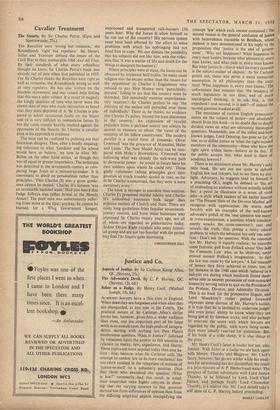Cavalier Treatment
The Stuarts, By Sir Charles Petrie. (Eyre and
Spottiswoode,25s) .
THE Royalists were 'wrong but romantic,' the Roundheads 'right but repulsive.' So Messrs. Sellar and Yeatman defined the issues of the Civil War in their memorable 1066 And All That. By their standards of what every schoolboy thought he knew, Sir Charles Petrie's book was already out of date when first published in 1937. For Sir Charles thinks the Royalists were right as well as romantic, the Roundheads wrong as well as very repulsive. He has also written on the Jacobite movement, and one cannot help feeling that this was a safer subject. It is easier to magnify the kingly qualities of men who never wore the crown than of men who made themselves so hated that they were deprived of it. Sir Charles is pre- pared to admit occasional faults on the Stuart side (it is very difficult to romanticise James 1); but the cards remain heavily stacked.against the opponents of the Stuarts. Sir Charles is cavalier even in his approach to evidence.
The issue can be confused by pointing out that historians disagree. Then, after a briefly disparag- ing reference to what 'Gardiner and his school would have us believe,' we. turn to what 'Mr. Be!toe on the other hand writes,' as though this was of equal or greater importance. The technique was described in the seventeenth century as com- paring lingo Jones to a mousetrap-maker. It is convenient to dwell on 'personalities rather than principles. 'That Charles [I] was a great gentle- man cannot be denied.' Charles 11's laziness 'was an invaluable national asset:. Had you heard that Judge Jeffreys was rather„brutal at the Bloody Assize? The poor man was unfortunately suffer- ing from stone at the titne; anyway, he.cannot be blamed, for a Whig Government hanged,
imprisoned and transported rick-burners 150 years later. Why did James II alloW himself to be run out of the country? His nervous system must have been affected by 'the effort to solve problems with which his upbringing had not fitted him to cope.' We can dismiss the possibility that his subjects did not like him, with the reflec- tion that 'it was a matter of life and death for the Whigs to denigrate his memory.'
Where principles were at stake, the issues can be obscured by irrelevant half-truths. 'In many cases religion was the excuse rather than the reason for the opposition' to Charles I. Englishmen who refused to pay Ship Money' were 'parochially- Minded,' failing to see that the country must be defended. Did somebody mention unparliamen- tary taxation? Sir Charles prefers to say 'the interests of the nation still prevailed over those of individuals.' There is, he thinks, no evidence that-Charles l's policy 'roused the least discontent in the country.'' An expression of • royalist prejudice from a 'partisan. source can always be quoted to reassure. us 'about 'the views. of the majority of his fellow countrymen.' The modern parallel is a useful form of innuendo. Oliver Cromwell 'was the precursor of Mussolini, Hitler and Lenin.' The New Model Army can be com- pared with Hitler's Brownshirts. 'Cromwell was following what' was already the well-worn path to dictatorial power : he would in future have his own soldiers upon whom he could rely.' Those godly volunteers (whose principles gave their generals so much trouble) denied in vain, so far as Sir Charles is concerned, that they were 'a mere mercenary army.'
The book is stronger in anecdote than analysis. Charles I's presumed marital fidelity and Charles H's undoubted mistresses bulk larger than arduous matters of Church and State. There are many long quotations frOtit familiar seventeenth- century sources, and' from those' historians who impressed Sir CharleS twenty years ago; not all of whom are regarded as ,authoritatiVe today. ,'dent Divine Right royalists who enjoy histori- cal gossip and are not 'too familiar With the period may find The Stuarts quite interesting.
CHRISTOPHER HILL


































 Previous page
Previous page